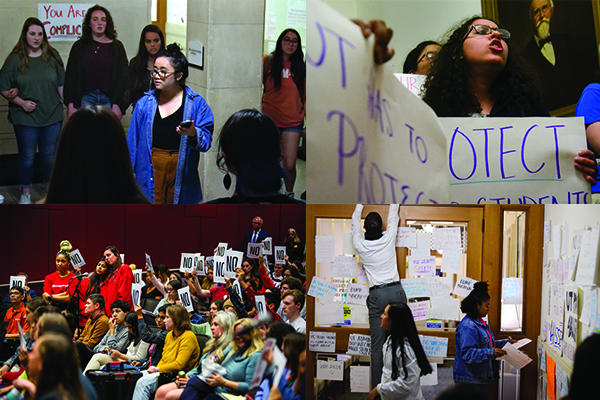Kevin Dalby, professor who violated UT sexual misconduct policy, receives grant from third-party research institute
October 28, 2021
Professor Kevin Dalby was awarded almost $4 million to fund a cancer research project early this October, two years after he was found in violation of UT’s sexual misconduct guidelines.
The grant came from the Cancer Prevention and Research Institute and not the University, but some students say the grant awarded to Dalby, a chemical biology and medicinal chemistry professor, still shows a culture of prioritizing success over accountability.
“Once he’s been awarded this grant, he’s gonna continue on this upward trajectory with his research,” said Kaya Epstein, Student Government’s Interpersonal Violence policy director. “The more notable his career accomplishments become, the less notable the harm he caused to students becomes.”
A UT employee told the Office for Inclusion and Equity in March 2019 that Dalby made “inappropriate comments of a sexual nature” to a graduate student, according to a UT report listing 17 faculty and staff confirmed of engaging in sexual misconduct. Dalby denied making some of the comments and tried to provide context for his other words, but the office found evidence that misconduct had occurred.
The University prohibited Dalby from supervising graduate students alone until this semester, according to the report. UT also required Dalby create a plan to maintain professional working relationships with students and present it to the dean of the College of Pharmacy.
Many heavily funded research projects have graduate students to help with research, however, UT spokesperson J.B. Bird said he did not know if Dalby’s research would have graduate student workers.
James Wilson, the chief scientific officer of the Cancer Prevention and Research Institute, said the institute was not aware of Dalby’s prior conduct when it awarded the grant. Students say Dalby receiving the grant shows a lack of transparency from UT about their faculty’s histories.
“All of the awards (given) by (the Cancer Prevention and Research Institute) are through application and are reviewed by experts that are convened to provide expert opinions on the most impacting applications,” Wilson said.
Starting March 2020, the University worked with law firm Husch Blackwell to implement a series of recommendations around sexual misconduct reform. Bird said the University has taken significant steps to increase transparency about sexual misconduct since it found Dalby and other staff members in violation of their policies, including updating disciplinary action policies. One of these updates include defining sexual harassment as offensive actions or words that impede a student’s equal access to education or programs, while it previously was defined as “unwelcome conduct of a sexual nature.”
“The University tailors disciplinary sanctions to reflect the violation, and we have terminated … faculty and staff members whose violations constituted a safety threat … while ensuring that faculty staff and students receive due process under constitutional requirements,” Bird said.
Dalby will teach PHM 181R and PHM 281N in spring 2022, according to the course schedule. He did not respond to multiple requests for comment.
With Dalby continuing to teach and receiving this grant, Epstein said her main concern is that new students will not know about his past misconduct due to a lack of transparency and acknowledgement of his history.
The UT Austin Sexual Misconduct Database includes the names of 30 staff members who have violated sexual misconduct policies since June 2013.
“The idea that students are walking into classrooms with potential predators … is terrifying,” Epstein said. “I don’t think the sort of person who thinks that behavior is appropriate in the first place should have the authority to be in positions of power, especially over students.”












